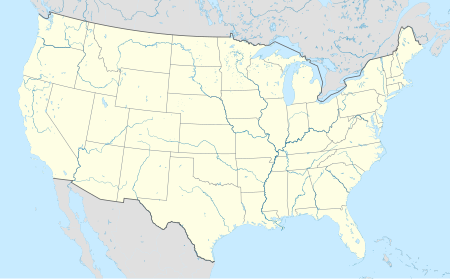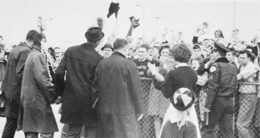
Jenison Fieldhouse is a 10,004-seat, later reduced to 6,000-seat, multi-purpose arena in East Lansing, Michigan. The arena opened in 1940 and was named for alumnus Frederick Cowles Jenison, whose estate, along with PWAP funds, funded the building. It was home to the Michigan State University Spartans basketball team before they moved to Breslin Center in the fall of 1989. Previously Michigan State College (MSC) basketball had played home games at Demonstration Hall and the IM Circle buildings.
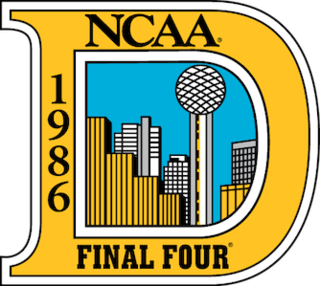
The 1986 NCAA Division I men's basketball tournament involved 64 schools playing in single-elimination play to determine the national champion of men's NCAA Division I college basketball. It began on March 13, 1986, and ended with the championship game on March 31 in Dallas, Texas. A total of 63 games were played.
The 1961 NCAA University Division Basketball Tournament involved 24 schools playing in single-elimination play to determine the national champion of men's NCAA Division I college basketball in the United States. It began on March 14, 1961, and ended with the championship game on March 25 in Kansas City, Missouri. A total of 28 games were played, including a third place game in each region and a national third place game.
The 1969 NCAA University Division men's basketball tournament involved 25 schools playing to determine the national champion of men's NCAA Division I college basketball. It began on March 8, 1969, and ended with the championship game on March 22 in Louisville, Kentucky. Including consolation games in each of the regions and an overall consolation game, a total of 29 games were played.
The 1970 NCAA University Division Basketball Tournament involved 25 schools playing in single-elimination play to determine the national champion of men's NCAA Division I college basketball. It began on March 7, 1970, and ended with the championship game on March 21 in College Park, Maryland. A total of 29 games were played, including a third place game in each region and a national third place game. This tournament was notable for the number of small schools that reached the Sweet 16, Elite 8, Final 4, and Championship Game. Another notable aspect of the tournament was that Marquette became the first team to turn down an announced NCAA Tournament bid for the National Invitation Tournament. Coach Al McGuire took issue with being seeded in the Midwest regional instead of the geographically closer Mideast. They were replaced in the field by Dayton. As a result of this action, the NCAA forbid its members from playing in other postseason tournaments if offered an NCAA bid.

The 1976 NCAA Division I Basketball Tournament involved 32 schools playing in single-elimination play to determine the national champion of men's NCAA Division I college basketball. It began on March 13, 1976, and ended with the championship game on March 29 in Philadelphia. A total of 32 games were played, including a national third place game.

The 1978 NCAA Division I Basketball Tournament involved 32 schools playing in single-elimination play to determine the national champion of men's NCAA Division I college basketball. It began on March 11, 1978, and ended with the championship game on March 27 in St. Louis, Missouri. A total of 32 games were played, including a national third place game.
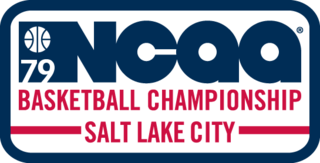
The 1979 NCAA Division I Basketball Tournament involved 40 schools playing in single-elimination play to determine the national champion of men's NCAA Division I college basketball. It began on March 9 and ended with the championship game on March 26 in Salt Lake City. A total of 40 games were played, including a national third-place game. This was the tournament's only edition with forty teams; the previous year's had 32, and it expanded to 48 in 1980. The 1979 Indiana State team was the most recent squad to reach a national title game with an undefeated record, holding that distinction for 42 years until the 2021 Gonzaga Bulldogs team won a 93-90 OT national semifinal over UCLA to reach the 2021 title contest vs. Baylor with a 31-0 record.

The 1980 NCAA Division I Basketball Tournament involved 48 schools playing in single-elimination play to determine the national champion of men's NCAA Division I college basketball. It began on March 6th, 1980, and ended with the championship game on March 24th at Market Square Arena in Indianapolis. A total of 48 games were played, including a national third-place game.
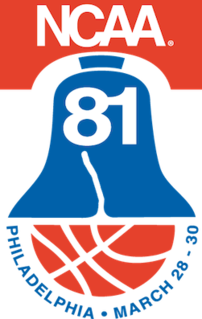
The 1981 NCAA Division I Basketball Tournament involved 48 schools playing in single-elimination play to determine the national champion of men's NCAA Division I college basketball. It began on March 12, 1981, and ended with the championship game on March 30 in Philadelphia. A total of 48 games were played, including a national third place game. It was also the last tournament to be televised on NBC, before CBS took over the following year. Additionally, it was the last season in which the NCAA sponsored championships only in men's sports; the first Division I Women's Tournament would be played the following year.

The 1983 NCAA Division I men's basketball tournament involved 52 schools playing in single-elimination play to determine the national champion of men's NCAA Division I college basketball. It began on March 17, 1983, and ended with the championship game on April 4 at The Pit, then officially known as University Arena, on the campus of the University of New Mexico in Albuquerque. A total of 51 games were played.
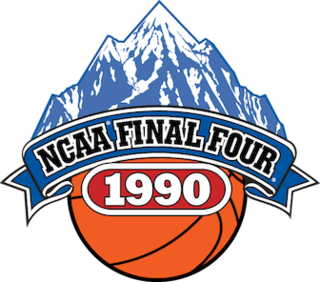
The 1990 NCAA Division I men's basketball tournament involved 64 schools playing in single-elimination play to determine the national champion of NCAA Division I men's college basketball. It began on March 15, 1990, and ended with the championship game on April 2 in Denver, Colorado. A total of 63 games were played.
Blacks have been participating in American college basketball for over a century.

The 1962–63 Loyola Ramblers men's basketball team represented Loyola University Chicago. The head coach was George Ireland. The Ramblers were the 1963 NCAA Tournament Champions, defeating top-ranked and two-time defending champion Cincinnati Bearcats in a 60–58 overtime contest. The 1962–63 Ramblers were one of the first NCAA men's Basketball teams to have broken the so-called "gentlemen's agreement" among coaches in which no more than two black players would be on the floor at one time : the Ramblers would regularly have three or four black starters, paving the way for the 1965–66 Texas Western Miners men's basketball team who would finally put the "agreement" to rest and have an all-black starting five. They played in the Game of Change, in which a Mississippi State team defied segregationists to play against Loyola, breaking the unwritten law that Mississippi teams would not play against black players.

The 2018 NCAA Division I women's basketball tournament began on March 16, 2018, and concluded with the national championship game on Sunday, April 1. The Final Four was played at Nationwide Arena in Columbus, Ohio. This is the third time that the women's Final Four was played in Ohio after previously being held in Cincinnati in 1997 and Cleveland in 2007 and the first time that the women's Final Four was played in Columbus. For only the fourth time in the tournament’s 37-year history, all four of the number one seeds made it to the Final Four.
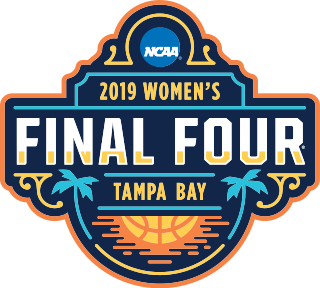
The 2019 NCAA Division I women's basketball tournament was a single-elimination tournament of 64 teams to determine the national champion for the 2018–19 NCAA Division I women's basketball season. The 38th annual edition of the tournament began on March 22, and concluded with the championship game on April 7 at Amalie Arena in Tampa, Florida, with the University of South Florida serving as host. The tournament field was announced on March 18.

The 2021 NCAA Division I men's basketball tournament was a single-elimination tournament of 68 teams to determine the National Collegiate Athletic Association (NCAA) Division I men's college basketball national champion for the 2020–21 season. The 82nd edition of the tournament began play on March 18, 2021 in sites around the state of Indiana, and concluded with the championship game at Lucas Oil Stadium in Indianapolis on April 5, with the Baylor Bears defeating the previously undefeated Gonzaga Bulldogs 86–70 to earn the team's first ever title.
The 1963 NCAA University Division Basketball Championship Game was the final of the 1963 NCAA University Division Basketball Tournament and determined the national champion in the 1962–63 NCAA University Division men's basketball season. The game was held on March 23, 1963, at Freedom Hall in Louisville, Kentucky. The matchup pitted the Loyola Ramblers, who were making their first NCAA Tournament appearance, against the Cincinnati Bearcats, the two-time defending national champions. After trailing by 15 points in the second half, Loyola rallied to force an overtime period, and won the game 60–58 on a basket by Vic Rouse with one second left. The Ramblers earned their first championship in men's college basketball.
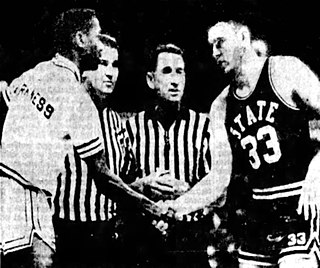
The Game of Change was a college basketball game played between the Loyola Ramblers and the Mississippi State Bulldogs on March 15, 1963, during the second round of the 1963 NCAA University Division Basketball Tournament, at Jenison Fieldhouse in East Lansing, Michigan. Taking place in the midst of the American civil rights movement, the game between the integrated Loyola team and the all-white Mississippi State team is remembered as a milestone in the desegregation of college basketball.
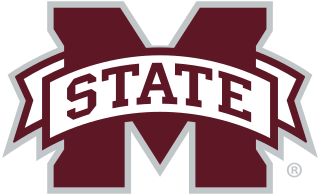
The 1962–63 Mississippi State Bulldogs men's basketball team represented Mississippi State University in the 1962–63 NCAA University Division men's basketball season. Led by head coach Babe McCarthy, the Bulldogs finished with a 22–6 record and received an invitation to the NCAA Tournament in the Mideast region.

